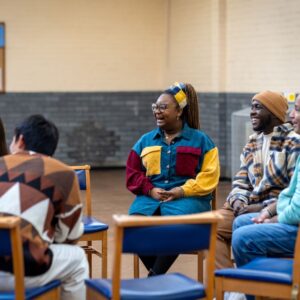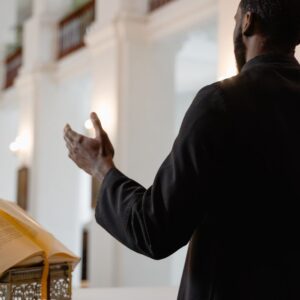As part of my internship for Episcopal priesthood, I had been serving at Edible Hope Kitchen in the Ballard neighborhood of Seattle for just a few months. The volunteers there serve substantive meals and gallons of coffee every weekday morning to anyone who shows up, often more than 200 meals/day, for free. Somewhere in the middle of the season that we call the Big Dark, where the hours of potential sunlight are greatly dwarfed by latitude and the reality of clouds, despair broke in.
I was loading the recently-donated industrial dishwasher when I heard a shout from Nancy, who had been one of the founders of this ministry 30 years prior, when she was early in retirement. She was in the kitchen, calling out to one of the patrons as he filled his coffee mug, rushing over as she dried her hands to stand before him to ask more quietly, “How’s the search — did you hear back?” I didn’t need any additional information to know she was asking about his housing applications. Many here were somewhere in the process; most, perhaps, at the final stage of having given up the search.
He gave a short laugh — an attempt at positivity, tainted by the underlying cynicism. “Not yet. I’ve followed up every way I know how. No one calls back.” As often happened in conversation with Nancy, he found himself in the middle of her spontaneous prayer, asking for God’s care and protection over him, for room to open up for him soon, for him to be remembered and favored.
I returned to my tasks; he turned to the warmth of the mug and filling tables.
It wasn’t until months later that I thought of him again. There were so many people searching, so many faces that came and went, and I hadn’t kept tabs on everyone. I didn’t know his name or remember his face; I just remembered his voice, its quiet exhaustion moving towards hopelessness.
When Scripture Finds You: Making the Connection
What brought him to mind was the passage in Luke 18, where Jesus tells a parable of a persistent widow. She keeps approaching the judge, demanding justice against her adversary (we never hear how she was wronged), and finally he does so. Not out of fear of God or acquiescence to popularity, not even out of the goodness of his heart: he follows through for purely selfish reasons, “that she won’t eventually come and attack me!'” She gets justice because she keeps showing up, calling out, persisting.
Nancy is the parable’s widow who calls out to God for justice, but the man is also that widow. He was showing up, following up, calling, messaging — and feeling unheard, worn down, invisible. I wonder what it means that, in Jesus’ view of the world, persistence brings about the desired outcome.
From One Story to Everyone’s Story: Widening the Lens
Many of us have been there for at least a moment, navigating through circular phone trees and dense bureaucratic systems, wondering if the effort even matters. For some, this can become a way of life. The housing applications that never get a reply, the medical need and insurance system that don’t align, the erroneous charge on a bank statement and not being able to get a human on the phone.
We could hear Jesus’s parable and admire the widow’s tenacity, draw the simple lesson of perseverance: keep fighting for what you want until you win! But I think we’re meant to also look around us and notice the people who are living her story right now.
Naming What’s Broken: The Justice Issue
Ballard, where that meals ministry lives, is in the most wealth-disparate places in Seattle, which is a significant city of income inequality. The wealthiest fifth of Seattle households earn 21x more than the poorest fifth (The Seattle Times). Even for those who have housing, nearly a third (38.2%) of Seattle households are “housing burdened,” spending more than 30% of their income on housing costs (source). While the statistics are sobering, and demonstrate the scale of the problem, it’s the voices that stay with me: the man getting coffee that dark morning, a congregant who moved twice in one year when landlords sell the property, a friend debating whether to use his paycheck towards back-rent or to save it towards first and last month’s rent in a more affordable city.
Housing is an economic concern for many; it should be a moral concern for all of us. Throughout scripture, God’s vision of a flourishing community includes safety and belonging — even the nomadic Israel wandering through the desert have resources amongst themselves. In Acts, the early church shares resources so that “there were no needy persons among them.”
God cares about the widow finding justice, and God cares about our neighbors finding safe places to sleep.
From Outrage to Action: The Invitation
Justice sermons often get stuck at “here’s what’s wrong.” But the gospel never stops there—it always moves toward “here’s what’s possible.”
So here’s what’s possible:
- As a church, we can learn our city’s housing policies and advocate for affordable housing initiatives.
- We can partner with local nonprofits that walk alongside people searching for stable housing.
- We can open our own spaces—parsonages, unused rooms, fellowship halls—to short-term housing ministries.
- We can pray not as a substitute for action but as the fuel that keeps us showing up, like the widow, until change comes.
This isn’t about doing everything at once. It’s about finding the one faithful step we can take together, rooted in God’s vision for a just and compassionate community.
Closing the Loop: Returning to the Image
I don’t know where the man from the coffee shop is today. I hope he’s found a place with a front door he can call his own.
But I do know this: the gospel refuses to let us walk away from moments like that unchanged. It invites us to listen, to let scripture sharpen our sight, and to join God’s persistent work for justice—until every neighbor can rest secure in their own home.
The Anatomy of Justice Preaching: A Framework for Your Sermon
(For preachers who want to connect scripture, story, and justice)
- This gives your staff a finished example that: Shows the process from lived moment → scripture → shared human connection → justice issue → actionable next step.
- Demonstrates the “how-to” by embodying it instead of explaining it step-by-step.
- Models tone—pastoral warmth + prophetic clarity—so justice is framed as a gospel calling, not partisan politics.
This article doesn’t just tell a story—it demonstrates a process you can use in your own preaching. Here’s the anatomy of what’s happening:
1. Start with a lived moment
- Choose something concrete, specific, and human—an overheard conversation, a personal memory, a scene you witnessed.
- Keep it small and sensory; the power comes from detail, not grandeur.
2. Let scripture come alongside the story
- Introduce a biblical text that resonates with the lived moment.
- Show your own process: How did the text and the moment connect for you?
- Let scripture illuminate the personal story, and let the personal story give fresh urgency to the scripture.
3. Widen from “my story” to “our story”
- Name the shared human experience the story represents.
- Use inclusive language (“we,” “us,” “maybe you’ve…”).
- Invite listeners to see themselves in the narrative.
4. Name the justice issue
- Make the connection from lived experience to systemic reality.
- Use both data and personal voices, but weave them into the narrative rather than listing facts.
- Ground the justice concern in scripture’s vision for community.
5. Offer a call to action that feels like invitation
- Suggest specific, doable steps (individual and communal).
- Frame action as part of joining God’s ongoing work, not as a guilt trip.
- Keep “we” language so the congregation feels you’re in it together.
6. Close the loop
- Return to the opening image or moment.
- Let the ending carry a sense of hope and possibility.
- Leave one resonant image or line for people to carry with them.
This approach helps justice preaching stay deeply pastoral while still being boldly prophetic—anchored in real human lives and in the living Word of God.










0 Comments